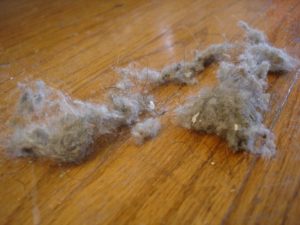 Want to prevent your children from having allergies or asthma? A recent study adds support to increasing evidence that growing up on a farm, or living among multiple pets in the first year of life is protective against developing allergies and asthma. This is because exposure to lots of animal and outdoor soil bacteria in early childhood is good for the developing immune system. The study, which was conducted by Finland's National Institute of Health and Welfare, carried this line of work further and found that this type of beneficial farm microbial exposure could be duplicated in non-farm homes.
Want to prevent your children from having allergies or asthma? A recent study adds support to increasing evidence that growing up on a farm, or living among multiple pets in the first year of life is protective against developing allergies and asthma. This is because exposure to lots of animal and outdoor soil bacteria in early childhood is good for the developing immune system. The study, which was conducted by Finland's National Institute of Health and Welfare, carried this line of work further and found that this type of beneficial farm microbial exposure could be duplicated in non-farm homes.
They found that children's risk of developing asthma decreased as the similarity of their home's bacteria became more similar to that of farm homes. The researchers analyzed living room dust from homes and found that certain types of outdoor soil microbes were beneficial for preventing asthma. They found higher levels of these bacteria (and archaea, another microbe) in homes where people wore their outdoor shoes in the house, as well as 3 or more children, and increased moisture in houses. The types of fungi found in the dust of farm and non-farm houses didn't seem to matter. The researchers mention that the same kind of protective (for asthma) results of soil microbes has also been shown in mice.
Additional thoughts reading this: The study results can be interpreted as playing and crawling outdoors is definitely beneficial to children's health, especially young children. Exposure to soil microbes! And, of course, having pets. But wearing outdoor shoes indoors is problematic in areas with high lawn and garden pesticide use (e.g. suburban NY and NJ!) because studies show the pesticides get tracked indoors. This same problem occurs in areas with high lead levels (around older homes) or other heavy metals.
From Science Daily: Farm-like indoor microbiota may protect children from asthma also in urban homes
Earlier research has shown that growing up on a farm with animals may as much as half the risk of asthma and allergies. The protective effect is thought to be attributable to the diverse microbial exposures encountered on farms.
"We now discovered that the presence of farm-like microbiota in an early-life home seemed to protect from asthma also in urban homes. The effect was not based on the presence of large number of different microbial species but rather differences in the relative abundance of certain bacterial groups," says Pirkka Kirjavainen, Senior Researcher at the Finnish National Institute for Health and Welfare.
The study found that the microbiota in homes protecting from asthma contained a wealth of bacteria typical of the outdoor environment, including bacteria in soil. On the other hand, the proportion of microbes normally occurring in the human respiratory tract and associated with respiratory tract infections was small. "The key characteristic of microbiota in homes protecting from asthma appears to be large abundance of bacteria which originate from the outdoor environment and are beneficial or harmless to health, relative to bacteria that are a potential threat to health," Kirjavainen comments.
In urban homes, factors that increased the farm-like features in the microbiota included wearing outdoor shoes indoors, the number of siblings and the age of the house; all factors that may increase transport of outdoor microbes into the home.
Asthma is the most common chronic disease in children in Finland -- can new cases be prevented in the future? "It is interesting to see how clear of a protective effect indoor microbiota can have against the development of asthma. In contrast, it has been considerably more difficult to identify microbiota that would explain the detrimental effect of moisture damage on asthma," says Professor Juha Pekkanen.Asthma is the most common chronic disease in children in Finland as well as in many other countries, and its prevalence is increasing with urbanisation. The new study supports the view that children's early exposure to 'right cocktail' of microbes may help their bodies to develop mechanisms protecting from asthma.
"The results suggest that asthma could be prevented in the future by modifying children's early microbial exposures," says Pekkanen.
